What is an antihero? According to the dictionary, an antihero is “a protagonist or notable figure who is conspicuously lacking in heroic qualities.”
In other words, an antihero is a character who does not fit the conventional mold of a hero, who may have flaws, weaknesses, vices, or questionable motives, but who still engages the audience’s sympathy, interest, or admiration.
Antiheroes have been around for a long time in literature, from Homer’s Thersites to Cervantes’ Don Quixote to Dostoyevsky’s Underground Man 2.
However, in recent decades, antiheroes have become increasingly popular and prevalent in television, especially in the genres of drama, crime, thriller, and fantasy.
Why are antiheroes so appealing to modern audiences? What makes them complex and compelling?
How do they challenge or subvert the traditional notions of heroism and morality?
Characteristics of Antiheroes
Antiheroes, as enigmatic and morally complex characters, have become a driving force in contemporary storytelling, captivating audiences with their intricate personalities and morally ambiguous choices.
From their blurred moral lines to their profound flaws, antiheroes embody a multifaceted range of characteristics that challenge conventional notions of heroism and villainy.
Moral Ambiguity
One of the defining traits of an antihero is their moral ambiguity.
They are not bound by the conventional notions of good and evil, often making choices that blur the line between right and wrong.
This complexity keeps viewers engaged as they try to decipher the character’s motivations.
Flawed Personalities
Antiheroes are deeply flawed individuals.
Their imperfections and vices are on full display, making them more relatable to audiences.
Their flaws can range from addiction and arrogance to ruthlessness and deceit.
Noble Intentions, Unconventional Methods
Antiheroes often have noble goals or intentions but employ unconventional and morally questionable means to achieve them.
Their ends might justify their means, but their methods often shock or disturb the audience.
Vulnerability
Antiheroes are not invincible.
They struggle with their demons, internal conflicts, and past traumas.
These vulnerabilities humanize them and allow viewers to connect on a deeper level.
Impact of Antiheroes on Television
The rise of antiheroes in TV shows has had a profound impact on the medium and its audience.
The emergence and ascent of antiheroes in the realm of television have left a mark on the medium, reshaping the way stories are told and characters are portrayed.
These morally complex figures, who defy traditional notions of heroism, have not only captured the hearts of audiences but have also catalyzed a significant shift in the way we perceive and engage with television.
These characters have altered the television landscape, leaving an enduring legacy in the evolution of storytelling and character development on the small screen.
Moral Complexity
Antiheroes have pushed the boundaries of storytelling, forcing audiences to grapple with complex moral dilemmas.
They challenge viewers to reevaluate their preconceived notions of right and wrong.
Viewer Empathy
The flaws and vulnerabilities of antiheroes make them more relatable to viewers.
Audiences can connect with these characters on a deeper level, fostering a greater emotional investment in the story.
Diverse Storytelling
Antiheroes have opened the door to a wide range of narratives and genres that were previously unexplored.
From crime dramas to dark comedies, antiheroes have revitalized television by offering fresh perspectives and innovative storytelling.
Examples of Antiheroes in TV Shows
Throughout the evolution of television, audiences have been introduced to a captivating array of antiheroes, complex characters who defy traditional heroic archetypes.
These morally ambiguous figures have become the centerpiece of numerous critically acclaimed TV shows, leaving an indelible mark on the medium.
These characters have transcended the screen, offering viewers a glimpse into the intricate interplay of good and evil, ultimately redefining the boundaries of storytelling in the world of television.
Walter White (Breaking Bad):
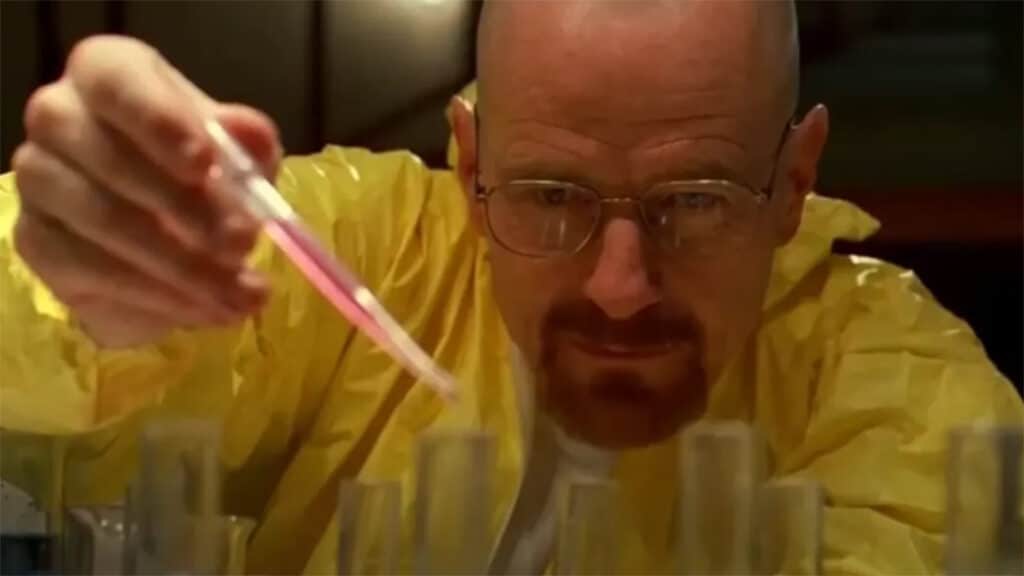
Walter White, the central character in the critically acclaimed TV series Breaking Bad, stands as a quintessential example of a complex antihero.
Initially introduced as a mild-mannered high school chemistry teacher diagnosed with terminal lung cancer, White’s transformation throughout the series is nothing short of extraordinary.
As his health deteriorates and financial pressures mount, he embarks on a dark journey that sees him delve into the world of drug manufacturing and distribution.
There are several compelling reasons why White embodies the complexity of the antihero archetype.
First and foremost, White exemplifies moral ambiguity.
He begins his descent into criminality with the noble intention of securing his family’s financial future after his passing.
This initial motivation makes the audience sympathetic to his plight.
However, as he delves deeper into the world of drug manufacturing and cartel violence, the lines between good and evil become increasingly blurred.
White’s actions, which include murder, manipulation, and lies, challenge the audience’s ethical judgments, leaving them conflicted about whether to root for or condemn him.
Moreover, his character is characterized by his extensive flaws.
His ego, pride, and ambition often drive him to make morally questionable decisions.
As the series progresses, White’s character arc becomes a case study in how an antihero’s gradual moral decline can captivate and disturb viewers simultaneously.
Despite his increasingly ruthless and unforgiving actions, viewers can’t help but feel a sense of empathy due to the vulnerability and personal struggles he faces.
White’s internal battles with his own demons, his fear of being forgotten, and his longing for validation humanize him, making his character all the more compelling.
Ultimately, White’s complexity as an antihero lies in his ability to draw the audience into his world of moral ambiguity, flaws, and inner turmoil.
As the series unfolds, it challenges viewers to explore their own moral compasses and judgments, making Breaking Bad a powerful testament to the allure and complexity of the antihero in modern television.
White remains a symbol of the blurred lines between heroism and villainy, leaving an indelible mark on the world of complex TV characters.
Tony Soprano (The Sopranos):
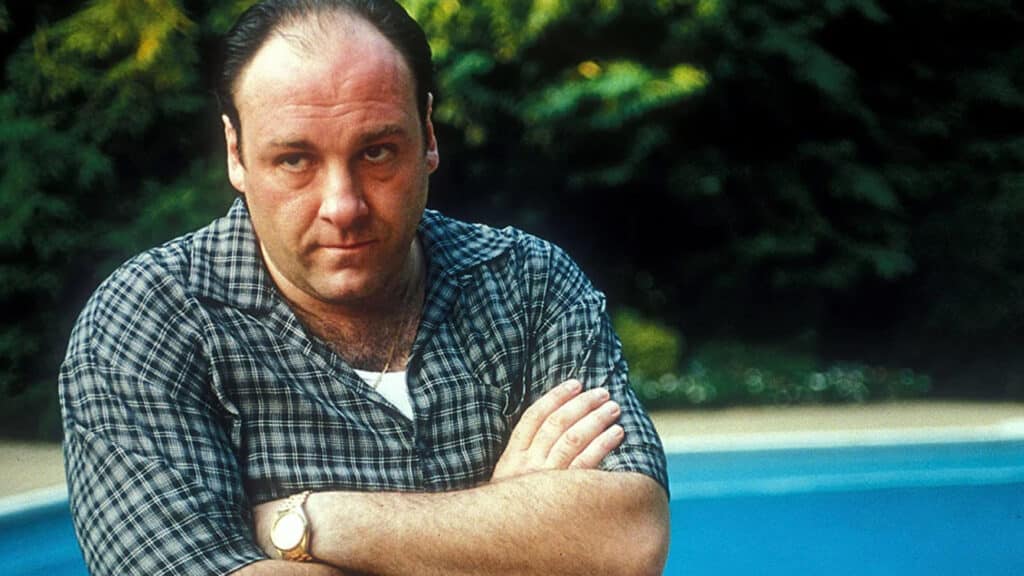
Tony Soprano, portrayed by the late James Gandolfini in the iconic TV series The Sopranos, is a prime example of a sympathetic antihero.
While he leads a life of crime as a mob boss, there are several reasons why audiences find themselves sympathizing with his character.
One of the key factors contributing to Tony Soprano’s status as a sympathetic antihero is his multifaceted personality.
He is a deeply complex character with a mix of admirable and deeply flawed traits.
On one hand, he displays love and affection for his family, including his wife Carmela and his children, which endears him to the viewers.
On the other hand, he’s involved in criminal activities that often lead to violence and suffering.
This duality in his character is what makes him so relatable, as many people can identify with the struggle between their better instincts and darker impulses.
Soprano’s struggles with his own mental health, particularly his battle with depression and anxiety, add another layer of sympathy to his character.
His therapy sessions with Dr. Jennifer Melfi, played by Lorraine Bracco, provide a window into his inner turmoil and emotional vulnerabilities.
These struggles humanize him, making him more than just a ruthless mob boss, but a man wrestling with personal demons, much like anyone in the audience might experience in their own lives.
Furthermore, The Sopranos is masterful in its exploration of the blurred lines between good and bad, showcasing the moral complexity of its characters.
This allows viewers to empathize with Soprano’s predicaments, as they recognize the external pressures and internal conflicts that shape his decisions.
His relationships with other characters, particularly his mother and his tumultuous, often tragic interactions with his family members and fellow mobsters, contribute to the sympathetic portrayal of Tony as he navigates an intricate web of loyalties and betrayals.
Soprano is a sympathetic antihero because of his intricate character development, his internal struggles, and the series’ profound exploration of moral ambiguity.
His multifaceted nature, love for his family, and vulnerability make him a character that viewers can’t help but root for, even in the face of his criminal actions.
Soprano’s portrayal in The Sopranos showcases the depth and complexity that can be achieved in the portrayal of antiheroes, drawing audiences into his morally ambiguous world.
Dexter Morgan (Dexter):

Dexter Morgan, the titular character of the TV series Dexter, is a prime example of a morally complex antihero.
Morgan is a forensic expert working for the Miami Metro Police Department, but he moonlights as a vigilante serial killer.
He follows a strict code, Harry’s Code, instilled in him by his adoptive father, Harry, which dictates that he only kills individuals who are confirmed murderers and have evaded justice.
This premise immediately sets the stage for the complexity of his character.
Morgan’s moral ambiguity is central to his character.
On the one hand, he is a cold-blooded killer who preys on criminals.
This vigilante aspect of his character challenges conventional notions of morality, as he is taking the law into his own hands and committing acts of murder.
However, he firmly believes he is doing a service to society by ridding it of those who have escaped the justice system.
This moral paradox forces viewers to question their own ethical values and grapple with the concept of whether the ends justify the means.
Furthermore, Morgan’s inner struggle is a major component of his moral complexity.
He is well aware that he has a dark urge to kill, but he also genuinely desires to lead a “normal” life.
His internal conflict between his innate desire for violence and his attempts to conform to societal norms is a central theme throughout the series.
This conflict humanizes him, making viewers sympathize with his predicament and the constant battle he wages against his darker impulses.
Morgan’s relationships with other characters, particularly his adoptive sister Deb, add another layer to his moral complexity.
His efforts to protect those he cares about and maintain a facade of normalcy demonstrate his capacity for love and compassion, even while he engages in horrific acts.
This dynamic showcases the intricacy of his character, leaving viewers torn between revulsion and empathy.
Morgan is a morally complex antihero due to the inherent contradiction of his character.
He is a serial killer with a twisted sense of justice, yet his internal struggles, desire for a “normal” life, and complex relationships with others make him a character that elicits both sympathy and discomfort from the audience.
Morgan’s portrayal challenges viewers to grapple with the boundaries of morality, making him one of the most compelling and morally intricate antiheroes in the world of television.
Rick Grimes (The Walking Dead):
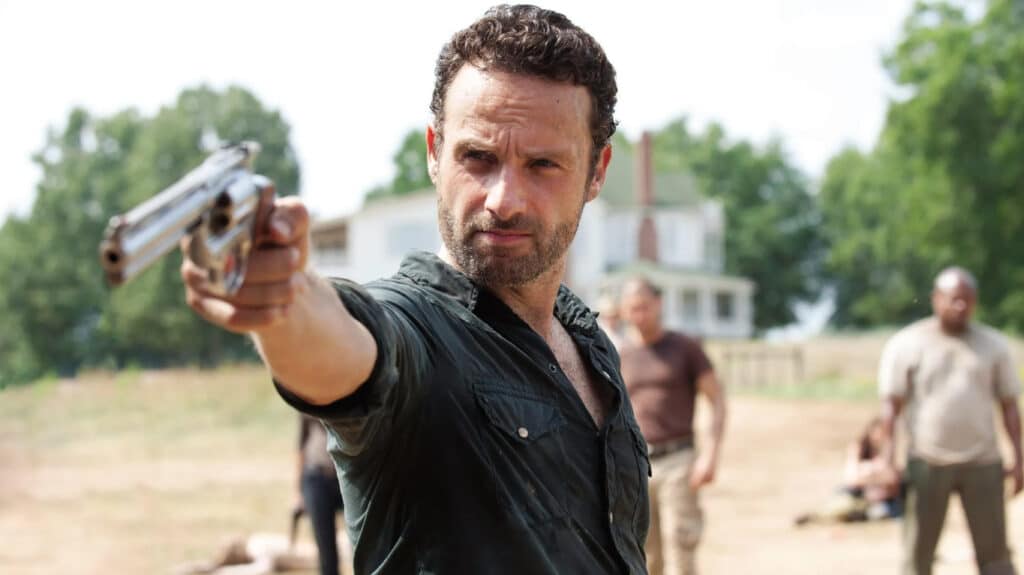
In the post-apocalyptic world of The Walking Dead, which is overrun by zombies, Rick Grimes’ evolution from a small-town sheriff into a morally complex figure is a testament to the depth of his character.
One of the key aspects of Grimes’ complexity is his moral ambiguity.
As the leader of a group of survivors, he is often tasked with making difficult decisions that challenge traditional notions of right and wrong.
Whether it’s deciding who to trust, how to handle threats, or what compromises to make for the greater good,
Grimes consistently grapples with ethical dilemmas.
His choices can be harsh, even ruthless at times, but they are driven by his commitment to protect his group and ensure their survival in a harsh and unforgiving world.
Grimes’ character also exemplifies his vulnerability.
Despite his position as a leader, he is far from invulnerable.
He experiences personal losses, inner turmoil, and moments of self-doubt.
His internal struggles with his own morality and the harsh realities of the post-apocalyptic world make him relatable to viewers.
This vulnerability humanizes him, making him a more compelling and sympathetic figure.
Furthermore, his character undergoes a significant transformation over the course of the series.
He evolves from a lawman upholding the rules of a civilized society to someone who adapts to a new world order where survival often requires bending or breaking those rules.
This transformation keeps the audience engaged as they witness his character navigate the complexities of a world where the boundaries between heroism and villainy are blurred.
Grimes is a complex antihero due to his moral ambiguity, vulnerability, and his evolution in response to the harsh realities of a post-apocalyptic world.
His character embodies the moral complexities and challenges of leadership in a world where traditional moral codes no longer apply.
Jaime Lannister (Game of Thrones)
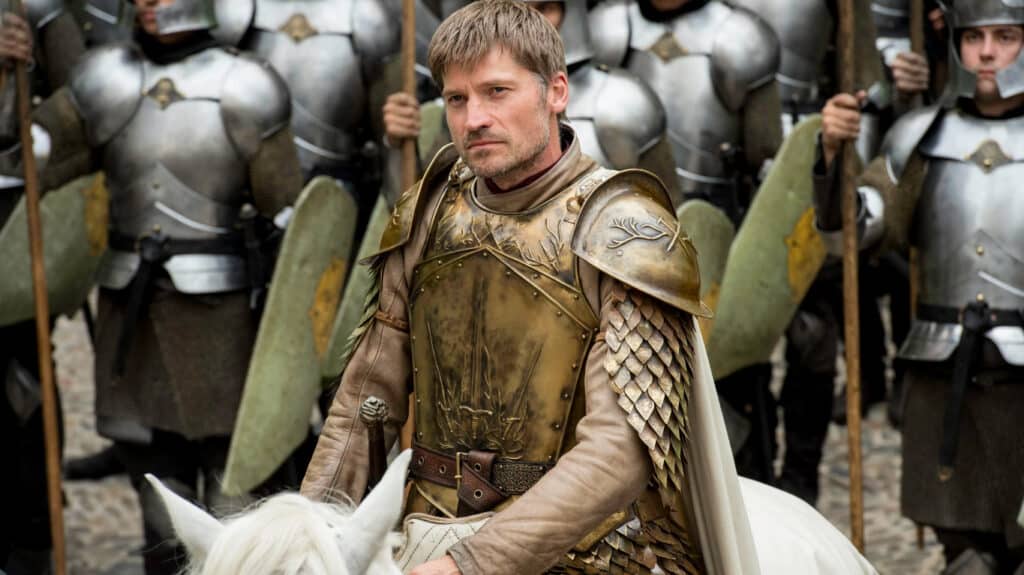
Jaime Lannister from the globally acclaimed series Game of Thrones stands as a prime example of an antihero, embodying the complexities and contradictions inherent.
At first glance, Jaime Lannister appears as a disdainful character, embodying the very essence of arrogance and moral ambiguity.
Known as the “Kingslayer” for assassinating the Mad King, his reputation is tainted by this act of regicide.
Yet, delving deeper into his character unveils layers of complexity that redefine conventional heroism.
Jaime Lannister’s arc is one of transformation and evolution.
Initially presented as a brash, arrogant member of the Kingsguard, his progression through the series peels away the superficial layers, revealing a character shaped by conflicting moralities and inner turmoil.
His journey challenges viewers’ perceptions and their understanding of morality in the context of a ruthless and intricate world.
What sets Jaime apart is his moral ambiguity.
He is a man defined by his contradictions, torn between his oath to protect the king and the ethical dilemma of standing by while the monarch indulged in madness.
His act of regicide, although deemed dishonorable by many, was a choice to prevent the greater harm the Mad King could inflict upon the realm.
The complexities of Jaime’s character deepen further through his relationship with his sister, Cersei, a taboo love that challenges societal norms.
Despite their incestuous bond, his protective instincts towards Cersei humanize him, underscoring the underlying vulnerability and capacity for affection within this character.
Moreover, Jaime’s physical transformation—from the “Kingslayer” to a man who loses his sword hand—becomes a metaphorical journey.
Stripped of his primary skill, his identity fractures, leading to an introspective exploration of who he truly is beyond his reputation and physical prowess.
This physical handicap serves as a catalyst for his internal evolution, a pivotal moment that accentuates his vulnerability and prompts a reassessment of his values.
His interactions with other characters, notably Brienne of Tarth, further illuminate his complexities.
The unlikely bond formed between Jaime and Brienne, a relationship based on mutual respect and understanding, sheds light on Jaime’s redeeming qualities.
His willingness to be perceived differently in the eyes of others, especially Brienne, hints at an inner desire for acceptance and recognition beyond his infamous reputation.
Jaime’s character journey is not one of absolute redemption, however.
He remains flawed, making decisions that are morally questionable and, at times, reverting to his less savory traits.
This duality cements his status as an antihero—neither wholly virtuous nor irredeemably malevolent.
His final actions in the series, departing from a pivotal moment of choice, encapsulate the essence of an antihero: a character striving for redemption but ultimately remaining captive to the complexities of his nature.
His evolution, moral conflicts, and inner struggles redefine the traditional hero archetype, presenting a character steeped in shades of grey, reflecting the intricate complexities of the human psyche.
Al Swearengen (Deadwood)
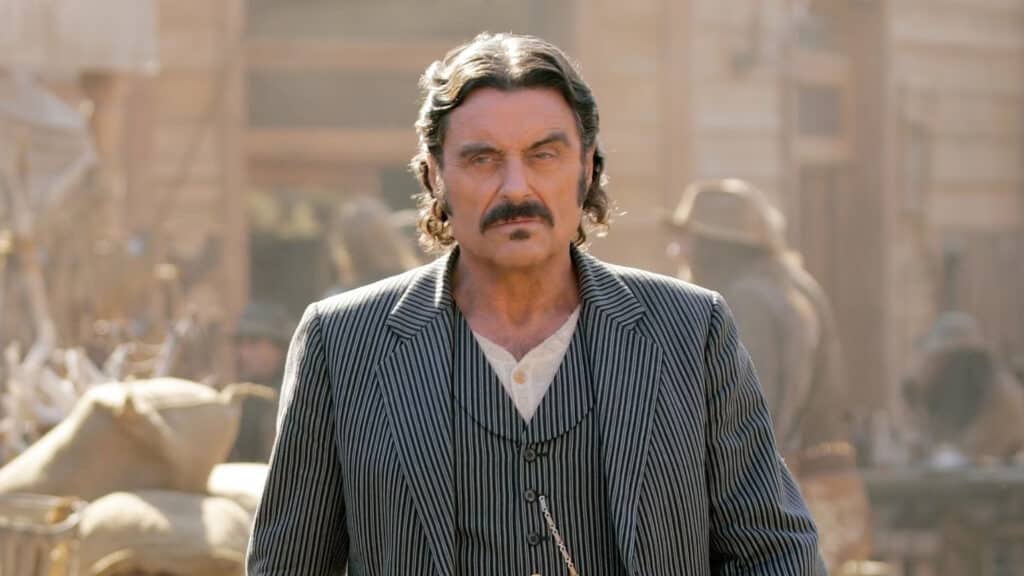
The character of Al Swearengen in the series Deadwood stands as a riveting and prime example of the quintessential antihero.
Portrayed by Ian McShane, Swearengen’s morally complex and layered persona navigates a world where shades of grey dominate, transcending the conventional notions of heroism and villainy.
Deadwood, set in the lawless town of the same name during the late 19th century, thrives on the moral ambiguity and raw realities of its characters.
At the heart of this narrative is Al Swearengen, a saloon owner, and crime lord, who, at first glance, embodies the epitome of ruthlessness and amorality. Yet, unraveling the layers of his character unveils a persona fraught with contradictions and unexpected depths.
Swearengen’s character possesses an undeniable magnetism.
He is manipulative, cunning, and often resorts to brutal methods to maintain control over the town.
His involvement in criminal activities, including prostitution and violence, forms the bedrock of his operations, cementing his reputation as a man unbound by societal norms.
However, what makes Al Swearengen a compelling antihero is the dichotomy of his character.
Beneath the callous exterior lies a man capable of surprising empathy and unexpected displays of altruism.
His genuine care for certain members of the community and his ability to form connections with individuals, despite his ruthless nature, highlight the complexities of his persona.
Furthermore, Swearengen’s pragmatism and his leadership style, although ruthless, often serve the town’s interests.
His actions, however morally dubious, maintain a semblance of order in the chaotic setting of Deadwood, blurring the lines between the greater good and his personal gains.
What distinguishes Swearengen is his profound understanding of human nature.
He navigates the town’s power dynamics and diverse personalities with shrewd intelligence, using his wit and cunning to manipulate situations and individuals to his advantage.
His ability to adapt to circumstances and his calculated approach to maintaining control over Deadwood showcase a strategic and calculating mind.
Swearengen’s relationships with other characters further add depth to his character.
His interactions with figures like Seth Bullock, the town’s lawman, reveal a complex web of conflict and respect.
The enigmatic dynamics between Swearengen and other key figures illustrate his ability to coexist between being an ally, adversary, or sometimes both simultaneously.
Moreover, his moments of vulnerability and introspection, particularly in his private dealings and his sporadic displays of remorse or regret, humanize a character otherwise depicted as ruthlessly driven by his own interests.
Ultimately, Al Swearengen’s character remains entrenched in a moral grey area.
He is not a traditional hero, nor an outright villain.
Instead, he embodies the intricate amalgamation of both—someone whose actions, though morally skewed, are often driven by survival instincts, an innate understanding of power dynamics, and an unexpected streak of humanity.
BoJack Horseman (BoJack Horseman)
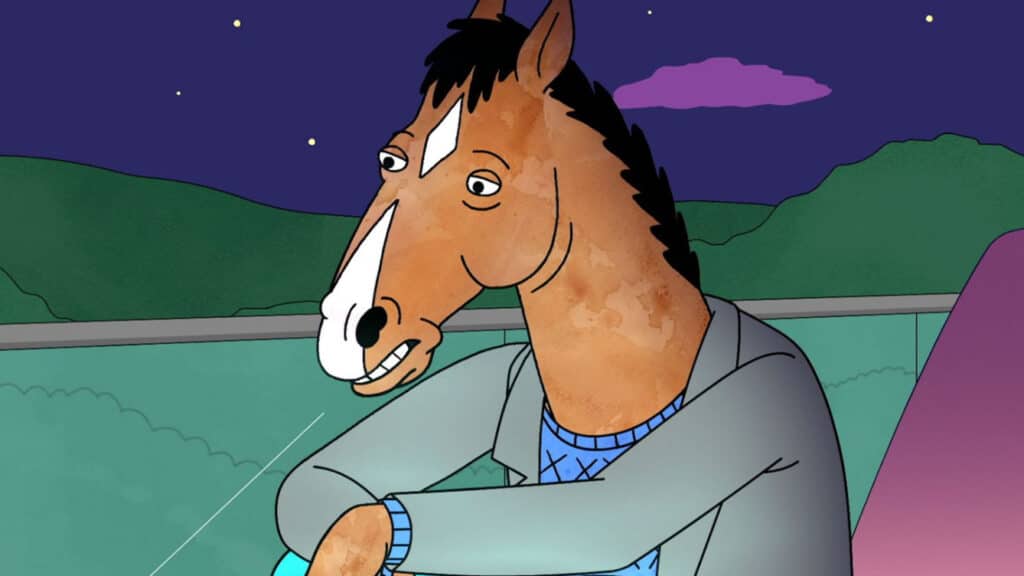
BoJack Horseman delves into the life of its titular character, a washed-up, anthropomorphic horse and former sitcom star, navigating the complexities of life, relationships, and personal demons.
BoJack’s portrayal as an antihero is a profound exploration of the human condition, encapsulated within the animated landscape.
At first glance, BoJack might seem like a typical antihero, riddled with flaws, self-destructive tendencies, and a relentless pursuit of self-gratification. He battles addiction, depression, and a profound emptiness despite his fame, wealth, and past success.
However, what distinguishes BoJack is the depth of his character and the journey he undertakes, grappling with his own shortcomings and attempting to find meaning in his existence.
BoJack’s struggle with his personal demons is at the heart of the series, and it’s this internal conflict that defines his status as an antihero.
His vices often lead him down a path of self-sabotage, causing harm to himself and those around him.
His propensity for making poor choices and sabotaging his own opportunities is a recurring theme, showcasing the darker aspects of his character.
Despite his deeply flawed nature, BoJack’s complexity lies in his self-awareness and moments of genuine introspection.
He grapples with guilt, remorse, and an acute understanding of his own failings, offering glimpses of vulnerability that make him relatable and human.
His profound longing for love, acceptance, and meaning serves as a powerful thread woven into the fabric of his character.
BoJack’s relationships with other characters, notably his interactions with Princess Carolyn, Todd Chavez, Diane Nguyen, and Mr. Peanutbutter, further highlight his multi-dimensional personality.
His connections, often strained or dysfunctional, demonstrate the intricacies of human relationships and the impact of his actions on those around him.
Moreover, the series doesn’t shy away from addressing deeper societal issues, including mental health, addiction, and the fleeting nature of fame.
BoJack’s struggles become a poignant reflection of the real-world challenges many face, offering a compelling narrative that resonates beyond the animated setting.
What truly distinguishes BoJack as an antihero is his ongoing journey of self-discovery and attempted redemption.
His awareness of his flaws and his attempts to rectify his mistakes signify a quest for growth and transformation, though often mired in setbacks and relapses.
This cyclical nature of his attempts at self-improvement cements his status as a character walking the thin line between redemption and regression.
His complexities, struggles, and continual pursuit of personal growth amid self-destructive tendencies redefine traditional notions of heroism.
The series’ ability to humanize and showcase the inner turmoil of a flawed character like BoJack reflects a deeper, more profound exploration of the complexities of the human condition.
Tommy Shelby (Peaky Blinders)
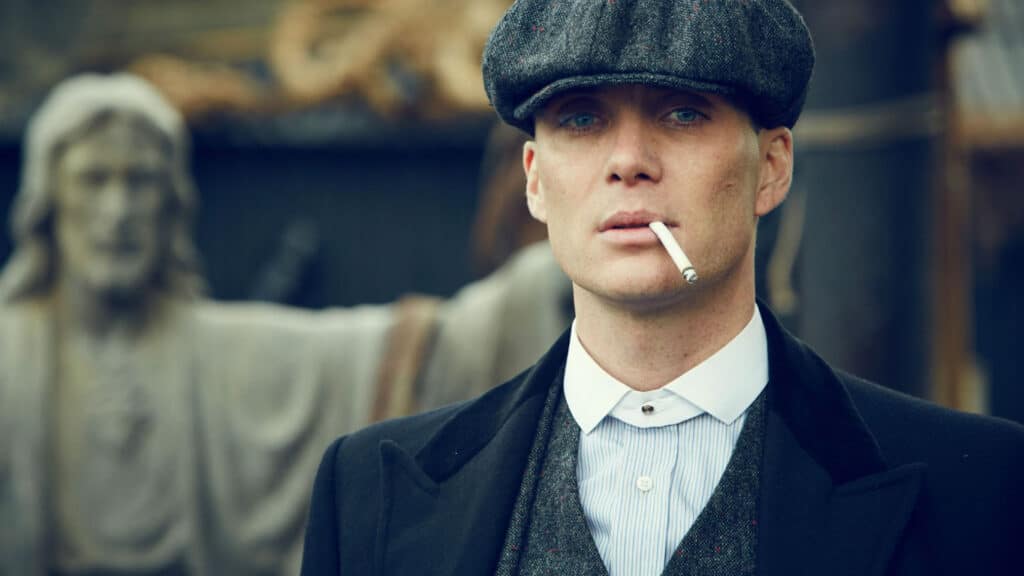
Tommy Shelby’s multifaceted persona, portrayed with depth and charisma by Cillian Murphy, weaves a narrative that challenges conventional heroism and delves into the shades of grey that define the antihero archetype.
Peaky Blinders, set in the aftermath of World War I, chronicles the Shelby family’s criminal enterprise in Birmingham, England.
At the heart of this intense and gripping saga is Tommy Shelby, the cunning, enigmatic, and ruthlessly ambitious leader of the Peaky Blinders gang.
At first glance, Tommy Shelby embodies the traits commonly associated with an antihero: a man driven by ambition, navigating the treacherous criminal underworld, resorting to violence and manipulation to achieve his goals.
His criminal pursuits, coupled with a fiercely guarded and often ruthless demeanor, establish him as a formidable and morally ambiguous figure.
What sets Tommy Shelby apart is the intricate tapestry of his character.
His past experiences in the war have left deep psychological scars, and his actions often stem from a desire for control, power, and a quest for justice amid personal trauma.
His pragmatism and strategic intellect guide his decisions, which, while often morally questionable, are rooted in a desire to protect and elevate his family’s status.
The complexity of Shelby’s character is further highlighted by his duality—his loyalty and deep love for his family contrast with his capability for ruthless and calculated actions.
His relationships with family members, notably his love for his aunt, Polly, and his protective instincts towards his younger brother, Arthur, provide glimpses of his softer side, portraying a man conflicted by duty and personal connections.
Moreover, Shelby’s ability to straddle the line between good and evil is a testament to his nuanced character.
While he partakes in criminal activities, his code of honor, and his willingness to protect the innocent, albeit in unconventional ways, humanize him and challenge the black-and-white notions of morality.
His interactions with adversaries and allies alike, including the likes of Inspector Campbell, Alfie Solomons, and his alliance with various political figures, unveil the intricacies of his character.
Shelby’s strategic and calculated alliances, often steeped in a moral grey area, serve as a testament to his intelligence and adaptability in a world marked by chaos and conflict.
One of the most compelling aspects of Shelby’s character is his gradual evolution and internal struggles.
As the series progresses, his journey grapples with the repercussions of his actions, haunted by guilt and questioning the legitimacy of his path.
His introspection and inner conflicts are poignant, shedding light on the emotional depth of a character caught in the crosscurrents of a tumultuous world.
His multi-layered persona, marked by conflicting morals, ambition, and an underlying sense of justice, redefines traditional heroism.
Shelby’s intricate journey, filled with moral dilemmas, internal battles, and the quest for power and redemption, positions him as a compelling and emblematic figure.
Conclusion
The rise of complex antiheroes in television has reshaped the landscape of storytelling and captivated audiences in ways previously unimagined.
The appeal of antiheroes lies in their multifaceted natures.
They are neither purely virtuous nor entirely villainous, and their internal struggles, vulnerabilities, and evolving moral compasses make them profoundly relatable.
They force viewers to question their own ethical values and challenge preconceived notions, offering a rich tapestry of complexity that keeps audiences engaged and invested in their stories.
As the era of complex antiheroes continues to unfold, it underscores the ever-growing hunger for narratives that delve into the human condition.
These characters remind us that life is far from black and white, and the shades of gray are where some of the most compelling stories are found.
Through their morally complex journeys, antiheroes serve as a mirror through which we examine our own moral compass, showcasing the beauty and messiness of humanity in all its intricate glory.
In the world of television, they have become more than just characters; they are reflections of our own inner complexities, and they leave an enduring legacy in the ever-evolving landscape of storytelling.

